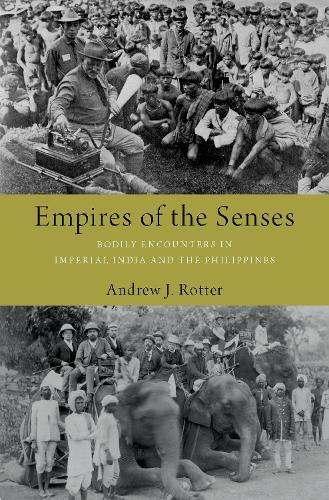Overview
When encountering unfamiliar environments in India and the Philippines, the British and the Americans wrote extensively about the first taste of mango and meat spiced with cumin, the smell of excrement and coconut oil, the feel of humidity and rough cloth against skin, the sound of bells and insects, and the appearance of dark-skinned natives and lepers. So too did the colonial subjects they encountered perceive the agents of empire through their senses and their skins. Empire of course involved economics, geopolitics, violence, a desire for order and greatness, a craving for excitement and adventure. It also involved an encounter between authorities and subjects, an everyday process of social interaction, political negotiation, policing, schooling, and healing. While these all concerned what people thought about each other, perceptions of others, as Andrew Rotter shows, were also formed through seeing, hearing, touching, smelling, and tasting. In this book, Rotter offers a sensory history of the British in India from the formal imposition of their rule to its end (1857-1947) and the Americans in the Philippines from annexation to independence (1898-1946). The British and the Americans saw themselves as the civilizers of what they judged backward societies, and they believed that a vital part of the civilizing process was to properly prioritize the senses and to ensure them against offense or affront. Societies that looked shabby, were noisy and smelly, felt wrong, and consumed unwholesome food in unmannerly ways were unfit for self-government. It was the duty of allegedly more sensorily advanced Anglo-Americans to educate them before formally withdrawing their power. Indians and Filipinos had different ideas of what constituted sensory civilization and to some extent resisted imperial efforts to impose their own versions. What eventually emerged were compromises between these nations' sensory regimes.A fascinating and original comparative work, Empires of the Senses offers new perspectives on imperial history.
Full Product Details
Author: Andrew J. Rotter (Charles A. Dana Professor of History and Peace and Conflict Studies, Charles A. Dana Professor of History and Peace and Conflict Studies, Colgate University)
Publisher: Oxford University Press Inc
Imprint: Oxford University Press Inc
Dimensions:
Width: 23.90cm
, Height: 2.80cm
, Length: 15.70cm
Weight: 0.703kg
ISBN: 9780190924706
ISBN 10: 0190924705
Pages: 388
Publication Date: 16 August 2019
Audience:
Professional and scholarly
,
General/trade
,
Professional & Vocational
,
General
Format: Hardback
Publisher's Status: Active
Availability: To order

Stock availability from the supplier is unknown. We will order it for you and ship this item to you once it is received by us.
Reviews
In this innovative contribution to comparative colonial history Andy Rotter opens up empire to the history of the senses. One of the joys of the book is that he is alive to the tragi-comic nature of the imperialist attempt to 'civilize' the vibrant sensory world of India and the Philippines. Empire of the Senses convincingly makes the case that the senses were central to the project of building and resisting an empire and will become essential reading for anyone seeking to deepen their understanding of the colonial experience. * Lizzie Collingham, author of Imperial Bodies: The Physical Experience of the Raj, c.1800-1947 * Andrew Rotter's Empire of the Senses is a tour de force not only for the history of imperialism and empire but also for sensory history generally. Rotter is the first historian of empire to apply the insights of sensory history, and he has produced a seminal book. * Mark Smith, author of The Smell of Battle, The Taste of Siege * This book stinks! Full of aromas and flavors, textures and tones, Empires of the Senses offers a beautifully written model for new ways of thinking critically about colonialism, power, and everyday life. A remarkable achievement by one of our most creative and provocative historians at the top of his game. * Christopher Capozzola, Massachusetts Institute of Technology *
Author Information
Andrew J. Rotter is Charles A. Dana Professor of History at Colgate University. A past president of the Society for Historians of American Foreign Relations, he is the author of Hiroshima: The World's Bomb (OUP, 2008), Comrades at Odds: Culture and Indo-U.S. Relations, 1947-1964, and The Path to Vietnam.




